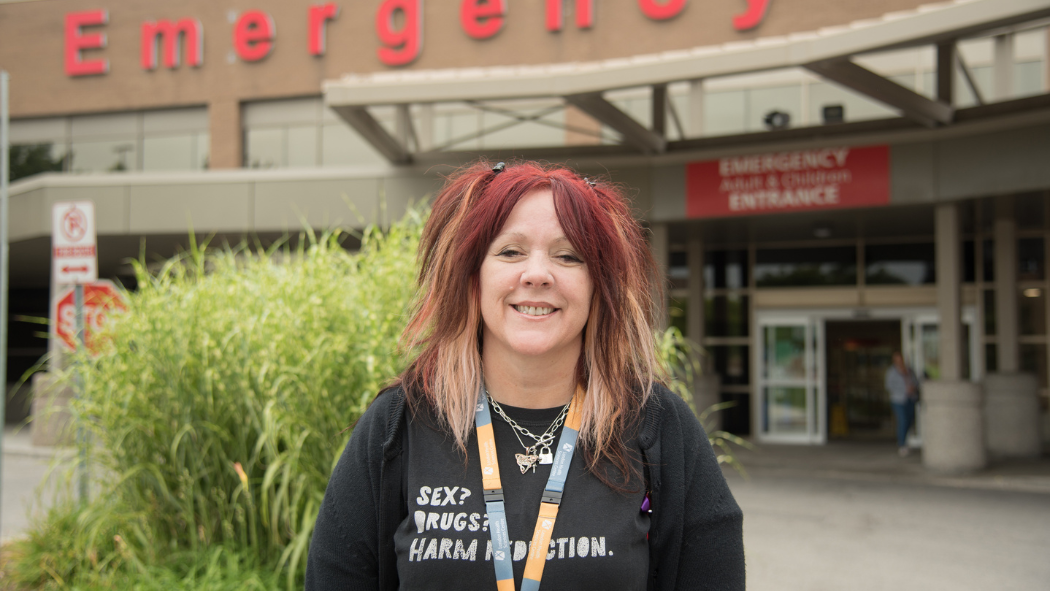
Image: Sue Macintosh, Harm Reduction Specialist from Regional HIV/AIDS Connection working at LHSC
November 17, 2023
Within the walls of London Health Sciences Centre (LHSC) there are patients who are receiving care while also experiencing the symptoms of withdrawal due to substance use.
To support patients in hospital who are experiencing addiction, LHSC has partnered with the Regional HIV/AIDS Connection (RHAC) and Canadian Mental Health Association Thames Valley Addiction and Mental Health Services (CMHA TVAMHS) to create the Addiction Medicine Consult Service.
Addiction Medicine Consult Service (AMCS)
RHAC has been, and continues to, advocate for improved and supportive care for patients who are experiencing addiction while they stay in hospital. And in 2021, they were invited to collaborate with CMHA TVAMHS and LHSC in creating the new Addiction Medicine Consult Service at LHSC.
Harm reduction is a term for interventions that are aimed to reduce the health and social harms associated with substance use.
RHAC has staff members on their teams who have a history, or are currently living with, addiction. Employing those with lived experience has been shown to be more effective with participants than those without the same experience. This model inspired the inclusion of a Harm Reduction Specialist who has that lived experience on the AMCS team at LHSC.
Sue Macintosh, Harm Reduction Worker with RHAC, and Harm Reduction Specialist on the AMCS team at LHSC, meets with inpatients that have been noted by staff to need support with their substance use.
Connecting with patients through lived experience
With her lived experience, Macintosh knows there is a need for this service and support. “It’s a lonely time in hospital, so I go around and talk to participants in departments in hospital and learn more about them to get to know them as a person,” Macintosh explains. “When you get to know them, you know how to treat them personally and medically.”
After years of struggling with substance use, Macintosh became abstinent from substances around 15 years ago. She is someone who has had similar experiences to the patients she speaks with and builds rapport in a different way from the other members of a patient’s care team.
Deborah Wiseman, President, Victoria Hospital, LHSC, says that integrating the wisdom and experience of those with lived experience raises the collective awareness of stigma, bias and assumptions that interfere in care delivery. “Additionally, lived experience expertise softens the formality of a clinical approach for our patients and enhances trust through credibility, affords a better understanding of their experience, and better legitimizes support options and resources offered ahead of discharge.”
Accessing the service
For those to access the service, once a person is admitted and is transferred to their room, the physician can make a referral requesting support from the consult service.
“I just go in, introduce myself, and ask questions from a place of curiosity. There’s a simplicity to what I do. I just meet people with dignity, compassion, kindness and understanding,” Macintosh says.
After speaking with a patient, Macintosh then connects with the patient’s care team and lets them know the needs of the patient and what supports they may require. Through this process she is able to build trust and help the patient and care team manage challenging interactions which may be caused by the painful process of withdrawal.
There are many reasons why a person who uses substances comes into hospital that may or may not be related to their addiction. But Macintosh and the AMCS team know that when a person is in pain, when their concerns are heard and their pain is managed, that person is more likely to stay in hospital for the length of time needed for their recovery.
“Due to historically negative experiences in hospital for those who use substances, we recognize it’s going to take time for some people to feel safe coming to hospital for care while they are in active substance use,” says Sonja Burke, Director, Harm Reduction Services, Regional HIV/AIDS Connection (recently retired). “But it’s people like Sue, with lived experience in harm reduction roles that can be those champions for patients.”
Harm reduction at LHSC
Substance use disorder is a medical disorder, however, there are still internalized biases within health care and the community about those who use substances. Part of the role of Harm Reduction Specialist is education through modelling.
When staff and physicians see Macintosh work with a patient, they hear the questions she asks them, how she talks to patients and they see how her compassionate response helps build trust with patients.
“People are going to connect with Sue in a way they aren’t able to with clinical staff,” says Burke. “Sue is a bridge. Trust is built easier with patients because she’s walked a mile in their shoes and we cannot put a price tag on that connection. It is a critical component of what’s been missing in clinical settings.”
Wiseman notes that it is important that patients are approached compassionately and that they feel supported to define their goals of care and make their own care decisions. “Each patient’s experience in their health journey is unique and the quality of life measured individually. This collaboration, this multi-service coordinated approach, enables a more effective and efficient response to the complex needs of our patients.”